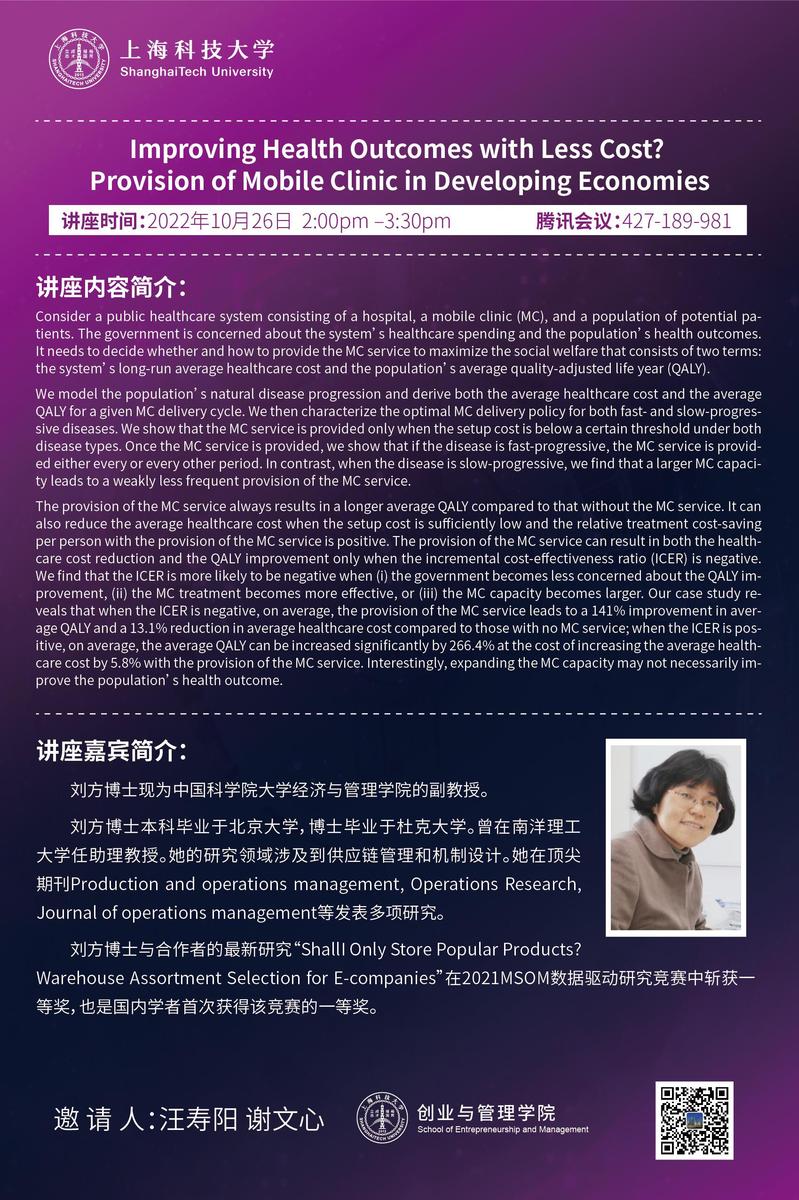Date & Time:October 26,2022 2:00- 3:30pm
Veune:Tencent Meeting
https://meeting.tencent.com/dm/tSYAgAi5kOGV
Meeting ID:427 189 981
Speaker:Prof. Fang Liu(University of Chinese Academy of Sciences)
Abstract:
Consider a public healthcare system consisting of a hospital, a mobile clinic (MC), and a population of potential patients. The government is concerned about the system’s healthcare spending and the population’s health outcomes. It needs to decide whether and how to provide the MC service to maximize the social welfare that consists of two terms: the system’s long-run average healthcare cost and the population’s average quality-adjusted life year (QALY).
We model the population’s natural disease progression and derive both the average healthcare cost and the average QALY for a given MC delivery cycle. We then characterize the optimal MC delivery policy for both fast- and slow-progressive diseases. We show that the MC service is provided only when the setup cost is below a certain threshold under both disease types. Once the MC service is provided, we show that if the disease is fast-progressive, the MC service is provided either every or every other period. In contrast, when the disease is slow-progressive, we find that a larger MC capacity leads to a weakly less frequent provision of the MC service.
The provision of the MC service always results in a longer average QALY compared to that without the MC service. It can also reduce the average healthcare cost when the setup cost is sufficiently low and the relative treatment cost-saving per person with the provision of the MC service is positive. The provision of the MC service can result in both the healthcare cost reduction and the QALY improvement only when the incremental cost-effectiveness ratio (ICER) is negative. We find that the ICER is more likely to be negative when (i) the government becomes less concerned about the QALY improvement, (ii) the MC treatment becomes more effective, or (iii) the MC capacity becomes larger. Our case study reveals that when the ICER is negative, on average, the provision of the MC service leads to a 141% improvement in average QALY and a 13.1% reduction in average healthcare cost compared to those with no MC service; when the ICER is positive, on average, the average QALY can be increased significantly by 266.4% at the cost of increasing the average healthcare cost by 5.8% with the provision of the MC service. Interestingly, expanding the MC capacity may not necessarily improve the population’s health outcome.
Speaker Biography:
刘方博士现为中国科学院大学经济与管理学院的副教授。
刘方博士本科毕业于北京大学,博士毕业于杜克大学。曾在南洋理工大学任助理教授。她的研究领域涉及到供应链管理和机制设计。她在顶尖期刊Production and operations management, Operations Research, Journal of operations management等发表多项研究。
刘方博士与合作者的最新研究“Shall I Only Store Popular Products? Warehouse Assortment Selection for E-companies”在2021MSOM数据驱动研究竞赛中斩获一等奖,也是国内学者首次获得该竞赛的一等奖。




